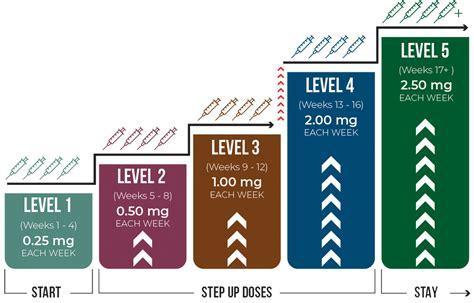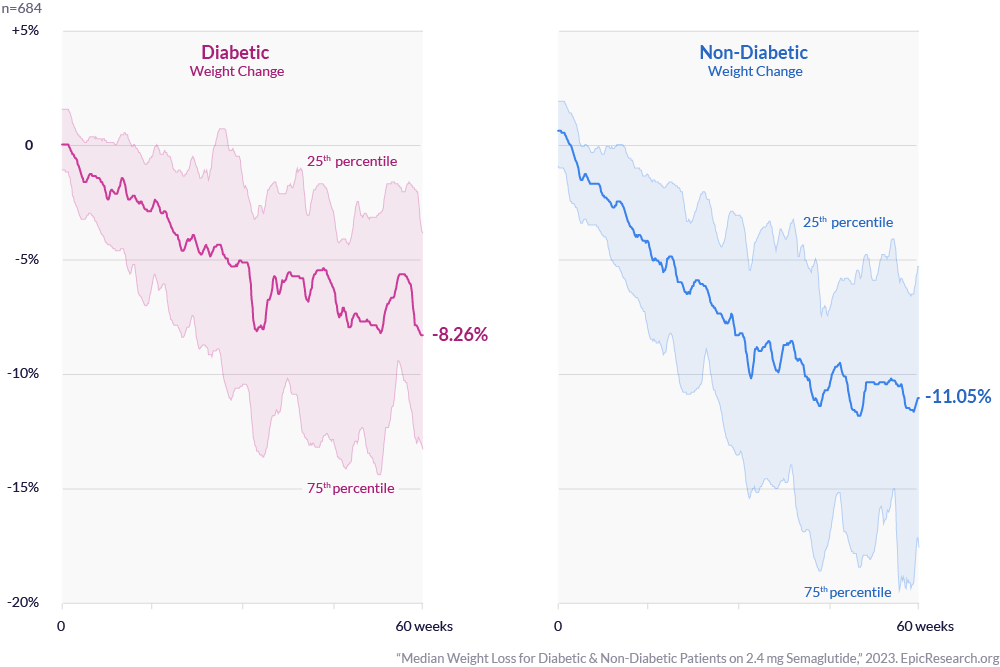Semaglutide was originally a medicine for type 2 diabetes but has recently become popular among non-diabetic individuals for its weight control capacity. Due to its appetite-suppressant characteristics, it has a considerable impact on body weight control by acting as a hormone that warns the brain to cease feeling hungry. Semaglutide, applied for weight loss purposes, can lead to marked reductions in body weight in obese or overweight adults without diabetes.
The focus on semaglutide for weight loss in non-diabetics is partly because recent studies have found that weekly dosing of the drug causes an average weight loss that is superior to the results of previous anti-obesity medications. The dosing is started cautiously and it is titrated up to the target in weeks allowing the body to adopt.
Semaglutide may be prescribed to patients seeking a weight loss option outside of diet and exercise when other means have failed to offer sustainable benefits. Patients should discuss with their healthcare provider to determine the correct dosage and the risks and benefits of semaglutide use as a weight management tool.
A significant development in weight control strategies is semaglutide, which affects appetite control via the central nervous system and impacts glucose metabolism without insulin.
Semaglutide is an analog of the human glucagon-like peptide-1 (GLP-1), an essential hormone in glucose metabolism. It has the same structure as the natural hormone but it has a longer half-life which makes it more effective in the long run. Its molecular design facilitates its binding to GLP-1 receptors in the pancreas, which in turn causes a glucose-dependent increase in the secretion of insulin. It also finds use in non-diabetic individuals for weight loss.
Semaglutide also contributes partially to weight loss in relation to appetite control. When given, it affects receptors of the CNS, which are concerned with the control of hunger and food intake. In addition, semaglutide prolongs the gastric emptying, which makes a person feel full longer after eating and as a result, leads to a lesser caloric intake. This collective biological action makes it effective as a weight-loss helper in non-diabetic people.

Non-diabetic weight loss prescription of Semaglutide is at dosages different from those used in treating diabetes.
Patients who are not diabetic and intend to take semaglutide for weight loss usually start with 0.25 mg once weekly. This subcutaneous injection acts as a starting phase to make the body used to the drug. The full semaglutide dosage for the weight loss chart is an ascending curve. The dose of subcutaneous semaglutide is mostly titrated to 0.5 mg once weekly after four weeks.
For long-term management of weight and with respect to the response of the patient and tolerance, the dosages could be gradually raised. To achieve a maintenance dose that results in continuous loss of weight. The dose of subcutaneous semaglutide for maintenance should not exceed 2.4 mg once weekly.
Adjustments in dose should be made with care and should normally not be over 0.5 mg per week. Should adverse effects be tolerable, one may slowly increase the doses till the required weight loss effect is obtained with an acceptable level of tolerability. Semaglutide administration must be carried out by training in proper techniques of injection.
The diabetic patients should be told to take the weekly continued subcutaneous semaglutide injection on the same day every week with or without food. Appropriate sites for the injections are the abdomen, thigh, or upper arm.
Furthermore, clients need to follow the dose regime and advise their healthcare provider if any side effects occur during the therapy.

Semaglutide has proved to be an important drug in weight control, especially in adults with overweight or obese but non-diabetic, inducing weight loss.
In clinical trials, patients receiving semaglutide achieved a substantial weight loss on average. At baseline body weight, the studies showed an average weight loss of 14.9% for 68 weeks. In the context of body mass index (BMI), these reductions represent a large movement towards healthier ranges for the participants.
Compared with the placebo, semaglutide shows a clear benefit in the evaluation of its efficacy. The mean weight loss with semaglutide is about 15.0%, which is significantly higher than the 2.4% to 3.6% with the placebo. This evidence places semaglutide as a superior option for achieving clinically significant weight loss as compared to both no treatment and other weight loss interventions that are currently available.
Non-diabetics should bear in mind the side effects and health problems of semaglutide weight loss. Common adverse effects are found in the gastrointestinal system, whereas some can have more serious effects.
Gastrointestinal disorders are the most often reported adverse effects of semaglutide. Patients might experience:
Often, these symptoms are not severe and get better as the patient’s body gets used to the medicine. Nevertheless, they are refractory in some individuals and may need medical management once they get worse.
Besides the acute side effects, there are some doubts concerning the long-term health hazards related to semaglutide. Studies indicate a possible association between the drug and an increased risk of:
Patients should be watchful for signs of severe adverse effects and consult their healthcare professional on the risk of starting semaglutide treatment.

It is crucial to refer to lifestyle practices that should be optimized in case of semaglutide use for weight loss. A diet and exercise program helps semaglutide work better.
Diet modification is critical in the management of weight while on semaglutide. A healthy diet should focus on:
Research indicates that weight losses of 5% to 10% result in fundamental amelioration in metabolic functions.
Continuous exercise enhances the weight effect of semaglutide.
Semaglutide has exhibited effectiveness in supporting weight loss in non-diabetic patients. Research shows that a titrated dosing schedule that begins at 0.24 mg per week with slow increases to the desired dose of 2.4 mg over several weeks is standard. Such an approach promotes the patient’s adaptation to the drug without side effects.
The substance is associated with an average weight reduction of approximately 11.85% versus the placebo. Many individuals, who failed to get any results in the previous weight loss attempts by non-surgical ways, achieved significant benefits from this treatment protocol. Safety and tolerability are crucial factors. Studies suggest that semaglutide is usually well tolerated, with the majority of side effects being mild and temporary. Nevertheless, monitoring by healthcare professionals is crucial for patients while being treated.
It is important that people who would like to use semaglutide for weight loss should talk to their healthcare provider to establish whether this treatment will be a suitable option for them. The weight loss effects of the drug along with its profile and safe nature make it an attractive option for obesity.
Semaglutide causes a reduction of appetite and intake of calories promoting weight loss efficiently.
Yes, semaglutide aids in chronic weight management by allowing the maintenance of low-body weight over the period.
Semaglutide aids in preventing weight gain post-dieting, crucial for weight loss maintenance.
Semaglutide is complemented by intensive behavioral therapy that ensures long-term lifestyle changes for weight control.
Semaglutide of weekly administration is initiated at 0.25 mg, which is gradually increased to 2.4 mg, promoting weight control without impacting diabetes mellitus.
We exclusively offer GLP-1 receptor agonists like semaglutide and liraglutide in our specialized store. This dedicated approach enables us to focus all our resources, knowledge, and efforts on delivering products of the highest quality.